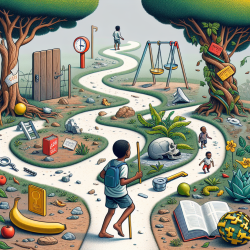Introduction
In the field of speech-language pathology, understanding the social dynamics and support systems of adolescents is crucial for developing effective therapeutic interventions. The research article "Social support among HIV-positive and HIV-negative adolescents in Umlazi, South Africa: changes in family and partner relationships during pregnancy and the postpartum period" provides valuable insights into the social experiences of young women during a critical phase of their lives. This blog aims to highlight key findings from the study and suggest ways practitioners can implement these insights to improve their skills and outcomes for young clients.
Key Findings from the Research
The study conducted in Umlazi, South Africa, explored how adolescent women’s relationships with family and partners evolved during pregnancy and postpartum. The research revealed several important patterns:
- Adolescent women experienced significant stress and instability in relationships during pregnancy and postpartum.
- Family members, particularly sisters, became the primary source of emotional and material support after the initial disclosure of pregnancy.
- Partner relationships were generally supportive during pregnancy but tended to weaken postpartum.
- Support experiences did not significantly differ between HIV-positive and HIV-negative women.
Implications for Practitioners
Practitioners working with adolescents can draw several actionable insights from this research:
- Focus on Family Engagement: Encourage open communication between adolescents and their families. Developing programs that facilitate family involvement can help ensure consistent support for young mothers.
- Leverage Sisterly Support: Recognize the role of sisters or sister-like figures as key support providers. Encourage adolescents to reach out to these figures for emotional and material support.
- Address Partner Dynamics: Help adolescents navigate changing partner relationships, especially postpartum. Support groups or counseling sessions can provide a platform for discussing these challenges.
- Consider Broader Social Factors: Understand the social context of the adolescent's environment, including societal stigmas and norms, to tailor interventions that address these external pressures.
Encouraging Further Research
While the study provides a comprehensive view of social support dynamics, there is room for further exploration. Practitioners are encouraged to engage in additional research to understand:
- The long-term impact of social support on adolescent mental health and child development.
- The role of cultural factors in shaping family and partner support dynamics.
- Effective strategies for integrating family and partner support into therapeutic interventions.
By staying informed and actively participating in research, practitioners can enhance their skills and contribute to better outcomes for adolescents.
Conclusion
The findings from the Umlazi study underscore the importance of social support for adolescent mothers. By focusing on family engagement, leveraging sisterly support, and addressing partner dynamics, practitioners can create a supportive environment that promotes positive outcomes for young women and their children. For those interested in delving deeper into the research, the original paper can be accessed here: Social support among HIV-positive and HIV-negative adolescents in Umlazi, South Africa: changes in family and partner relationships during pregnancy and the postpartum period.










